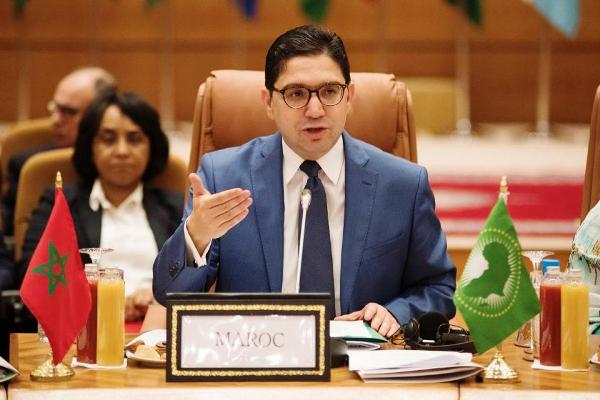
Rabat: Moroccan Minister of Foreign Affairs and International Cooperation, Nasser Bourita (pictured), has stressed that the AU Assembly Decision 693 must not be reinterpreted, by passed or instrumentalized, stressing that it is the responsibility of the AU states to protect, preserve and strengthen the decision.
AU Decision 693, among other things, calls for renewed efforts to overcome the current impasse in the negotiation process in the Sahara and to find a just, lasting and mutually acceptable political solution which will provide for the self-determination of the people of Sahara, in line with the relevant AU decisions and UN Security Council resolutions.
Bourita said at the African Ministerial Conference in Marrakech recently that Morocco reaffirms its commitment to the decision by making the conference a platform to reject any ambiguity.
“This orientation is now pushing Morocco to oppose any sterile debate exploiting the principle of the question of the Moroccan Sahara and to condemn political manipulation and Manichean overbidding,” Bourita stated.
According to Bourita, the United Nations (UN) is the only organization responsible for the “Moroccan Sahara” issues and the UN call on the African Union to play a role in supporting its efforts and not to interfere with those efforts.
“The AU support to the efforts of the UN is to support, preserve and protect the efforts of the UN and not to compromise or compete with them through parallel processes,” Bourita pointed out.
He added that reference to the question of the “Moroccan Sahara” must be made solely at the level of the Assembly of Heads of State and Government via the Troika mechanism.
“The position we are expressing today is in no way intended to diminish Africa’s role, it is Africa that the Kingdom seeks to give leadership,” Bourita stated.
According to Bourita, there is no leadership without unity involving the AU would be tantamount to cultivating its own division or running the risk of its implosion by marking the dislocation between two thirds of its member states which has resolutely refused to acknowledge the unacceptable and a group of countries still persist in maintaining anachronistic positions on the “Moroccan Sahara.”
“Leadership is about bringing people together, it is uniting efforts around the important challenges of our continent; leadership means ensuring cohesion of African countries in a calm and peaceful implementation of the processes that link the AU to its external partners,” Bourita explained.
He added: “By taking part in this conference you are placing yourself in respect for the UN process in the confidence of the institutions empowered to deal with the issue and in the legitimacy of international legality: in short, you are standing on the right side of history.”
The African Ministerial Conference was organized by the Kingdom of Morocco on March 25 on the support of the African Union to the United Nations-led political process on the regional dispute over the Sahara.
The conference created the opportunity for AU member states to reaffirm the African consensus around Decision 693 and to actively demonstrate African support for the ongoing political process within the United Nations framework towards a realistic, pragmatic and sustainable political solution to the Sahara issue which is based on compromise.
The Sahara issue is an ongoing conflict between the Polisario Front and the Kingdom of Morocco.
The conflict originated from an insurgency by the Polisario Front against Spanish colonial forces from 1973 to 1975 and the subsequent Western Sahara War against Morocco between 1975 and 1991.
Today, the conflict is dominated by unarmed civil campaigns of the Polisario Front and their self-proclaimed SADR state to gain fully recognized independence for Western Sahara. (End)
Source: By Catherine B. Nyenkan/WSG/PTK.
